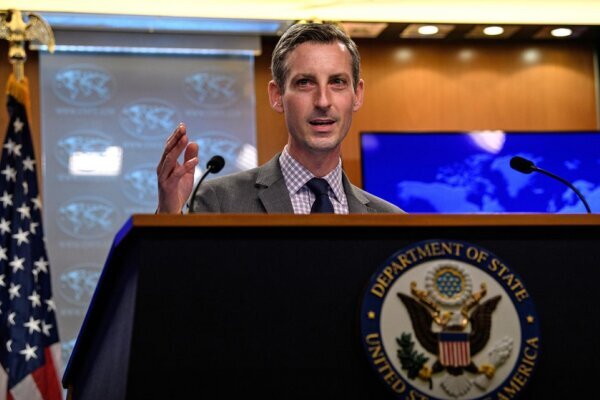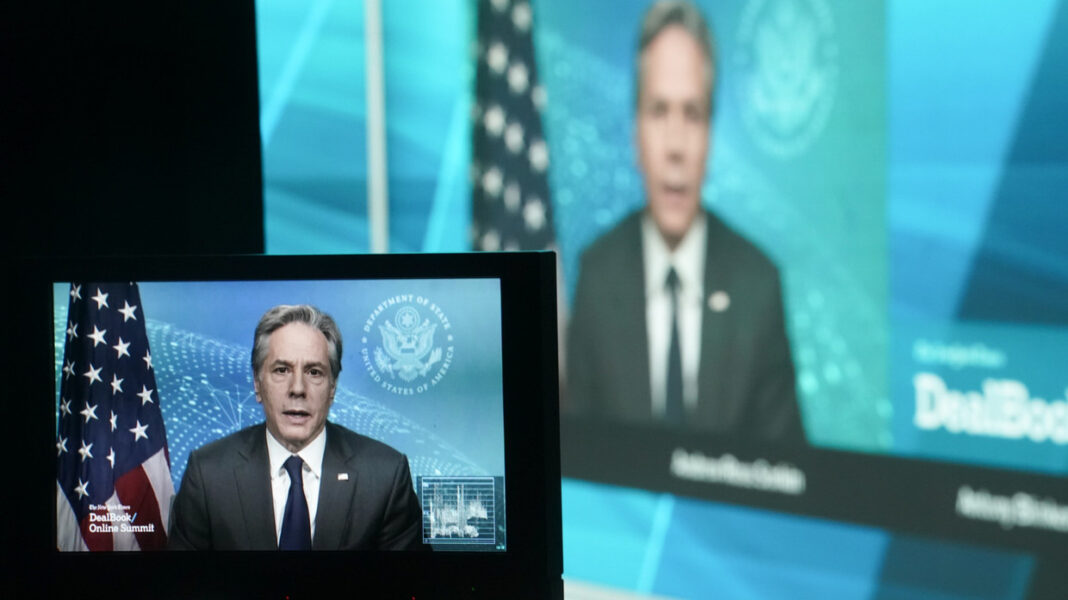
TEHRAN, Jan. 13 (MNA) – US State Department Spokesman Ned Price said that the United States in some ways more isolated diplomatically than Iran because of the course that the previous administration had pursued.
"So let me take those in order. So first, on the timeframe, I would make a couple of points. You’ve heard from us that the runway is short. The runway is very, very short. We are not talking about a protracted period of time that remains. We are talking about potentially weeks, not months," said Ned Price on Thursday in a press conference in response to some questions about the Vienna talks and Iran nuclear program.
"Second, it is impossible for us, at least at this point, to point out a date on the calendar and say that is the deadline. And it is impossible for a simple reason. You’ve heard me say before, this is not a temporal clock that is ticking down. It is a clock that is based on a calendar that is based on technical assessments. And really, what we are looking at here is a very simple equation: When do the nonproliferation benefits afforded by the JCPOA – as finalized in 2015 and implemented in 2016 – when are they overcome by the advancements that Iran has made in its nuclear program since it began to break free from the limits that it previously subscribed to after the last administration left the JCPOA? That is an assessment that will be based on a whole series of inputs, what we can discern publicly and non-publicly regarding those advancements and their implications for things like Iran’s breakout time when it comes to acquiring enough fissile material needed to produce a nuclear weapon if they were to move in that direction," he added.
Ned Price blamed the US previous administration for current problems with Iran over withdrawal from the nuclear deal, saying, "That is that we inherited a situation that none of us would have wished for, a situation in which Iran had been galloping forward in its nuclear program, freed from the nuclear shackles to which it previously subscribed, with proxies that certainly were not cowed but in some ways had become even more brazen and aggressive, with Iran – I should say with the United States in some ways more isolated diplomatically than Iran because of the course that the previous administration had pursued."
"I think if you ask anyone in this administration if we would have preferred to have entered into office on January 20th with Iran’s nuclear program verifiably and permanently constrained and Iran permanently barred from ever obtaining a nuclear weapon, the answer would be a resounding yes," he noted.
He reiterated the claim that Iran is seeking a nuclear weapon, saying, "Of course, we’re working now, this administration now is working very closely with them, both our European allies and our partners in this context, to see to it if we can arrive once again at a formula by which Iran is permanently and verifiably prevented from obtaining a nuclear weapon."
"This is about permanently and verifiably ensuring that Iran cannot obtain a nuclear weapon," he claimed.
These claims come while Tehran has repeatedly announced that it has no intention to build nuclear weapons as it has been banned by a religious Fatwa of the Leader of the Islamic Revolution Ayatollah Khamenei.
ZZ/14001023000040
By IFP Media Wire
January 14, 2022

US Secretary of State Antony Blinken has criticized former President Donald Trump for the current situation over Iran’s nuclear programme. The top diplomat has called Trump’s move to pull Washington out of the Iran nuclear dal as ”one of the worst decisions made in recent American foreign policy”.
“We had stopped them. The nuclear agreement that was reached some years ago by the [Barack] Obama administration put Iran’s nuclear program in a box,” Blinken said in an interview with US public radio station NPR.
“And one of the worst decisions made in recent American foreign policy was to walk away from that agreement,” the secretary of state added.
The Joint Comprehensive Plan of Action (JCPOA) was inked by Iran and six world powers in 2015. Under the deal, Tehran agreed to put limits on certain aspects of its nuclear activities in exchange for the removal of draconian international sanctions imposed against the country.
In 2018, however, the US pulled out of the pact and reinstated sanctions under the so-called ‘maximum pressure campaign’ against Tehran, effectively depriving Iran of the deal’s benefits by forcing third parties to stop doing business with Iran.
Iran remained patient for an entire year, after which it began to take incremental steps away from its nuclear obligations, especially after Europeans failed to salvage the deal under the US pressure.
The Islamic Republic’s decision to ramp up its nuclear activities prompted other parties to revive talks earlier this year.
“And as a result, we are in a challenging situation where, far from getting a new and so-called better agreement – that hasn’t happened – Iran has moved forward with its program in increasingly dangerous ways,” Blinken stated.
Tehran denies seeking nuclear weapons, stressing it wants to master nuclear technology for peaceful purposes.
There are only “a few weeks” left to save the Iran nuclear deal, and the United States is ready to look at “other options” if negotiations fail, the top diplomat noted.
“We still believe that if we can get back in the weeks ahead – not months ahead, weeks ahead – to the JCPOA, the nuclear agreement, that would be the best thing for our security and the security of our allies and partners in the region. But, we’re very, very short on time. The runway is very short,” the US secretary of state said.
Iran has rejected US officials’ remarks about a deadline for reaching an agreement and stressed the country is only after a good agreement.
“So we have, I think, a few weeks left to see if we can get back to mutual compliance. That would be the best result for America’s security. But if we can’t, we are looking at other steps, other options, again, closely coordinated with concerned countries,” he added.
Iranian officials have repeatedly stressed Tehran reserves the right to respond to any adventurism by the United States and Israel.
Iran and the five remaining parties to the JCPOA — Germany, Britain, France, Russia and China — began the talks in the Austrian capital in April with the aim of removing the sanctions after the US voiced its willingness to return to the agreement.
During the seventh round of the Vienna talks, the first under President Ebrahim Raeisi, Iran presented two draft texts which address, separately, the removal of US sanctions and Iran’s return to its nuclear commitments under the JCPOA. Tehran also said it was preparing a third draft text on the verification of the sanctions removal.
The eighth round of talks kicked off in Vienna in late December. The negotiations seek to restore the JCPOA in its original form and bring the US back into the agreement.
Iran insists that the talks must lead to the removal of all American sanctions that were imposed against Tehran following Washington’s unilateral withdrawal from the landmark agreement in May 2018. Tehran has also demanded credible guarantees that Washington will not abandon the deal again.
IFP Media Wire
Reports and views published in the Media Wire section have been retrieved from other news agencies and websites, and do not necessarily reflect the opinion of the Iran Front Page (IFP) news website. The IFP may change the headlines of the reports in a bid to make them compatible with its own style of covering Iran News, and does not make any changes to the content. The source and URL of all reports and news stories are mentioned at the bottom of each article.
No comments:
Post a Comment